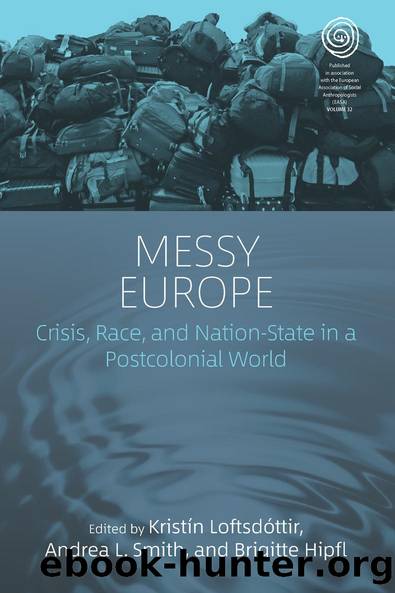Messy Europe by unknow

Author:unknow
Language: eng
Format: epub
Tags: Nonfiction, Social & Cultural Studies, Social Science, Human Geography, Anthropology, Political Science
ISBN: 9781785337970
Publisher: Berghahn Books
Published: 2018-02-19T05:00:00+00:00
Discussion
Examining discourses related to refugee deservingness reveals the implicit moral judgments that lie at the root of these assessments. While such judgments spring in part from personal convictions, they are also connected to extrinsic factors (Willen 2012), which in Irelandâs case include its historic and contemporary location on the margins of Europe, the economic crisis, and transnational discourses about asylum seekers that circulate throughout the Global North.
Irelandâs sense of marginality within a global communityâfueled at first by a long history of colonization and subsequent underdevelopment and now by disciplinary austerity measures partly imposed by the EUâis related to competing moral assessments of asylum seekers. When assessing asylum seekersâ deservingness for better living conditions and a permanent place in the nation, some pro-immigrant activists, including asylum seekers themselves, consider parallels between Irelandâs status as a postcolonial, emigrant-sending country and the position of the Global South. Others draw on transnational discourses of human rights to oppose ill treatment by the state, for example by pointing to the violence of deportation. In both instances, deservingness is based on perceptions of close social proximity (Willen 2012), either by virtue of a similar past or a shared humanity.
On the other side of the debate, perceptions that a great social distance separates Irish from asylum seekers contribute to some stakeholdersâ assessments that the latter do not necessarily deserve better living conditions, much less the right to settle in Ireland. These moral assessments draw on older discourses originating during the economic boom, which framed asylum applicants as âbogusâ in order to delegitimize their claims for protection and thus their juridical right to protection. Moreover, asylum seekers were posited as moral and economic threats to the nation through their childbearing, whichâwhile legal prior to the referendumâwas nonetheless deemed an abuse of Irish citizenship that also purportedly overburdened maternity hospitals. In post-referendum and post-boom Ireland, the focus is no longer childbearing but asylum seekersâ supposed abuse of the appeals process, which leads to long stays in direct provision and again, presents an economic burden to Irish society. However, the degree of perceived economic threat is arguably higher today, given the current economic insecurity, widespread social suffering due to austerity measures, and large numbers of asylum seekers entering Europe from the Middle East. As a result, many contest what they see as limited resources going to undeserving outsiders while they struggle to pay billsâan illustration of the relational nature of deservingness assessments (Willen 2012) and a facet of right-wing ânew nationalismâ that combines anti-state sentiment with concerns over resource allocation (Delanty 2000 cited in Garner 2006: 264).
The 2004 citizenship referendum and continued concern over relatively few asylum seekers is a response to the newfound European modernity, which is characterized in part by low fertility, an aging population, and high inward migration (Lele 2008). As in other European contexts, the Irish state and electorate have identified migration as the âproblemâ to be solved, as the referendum starkly illustrated (ibid.). But when it comes to demographic changes in the Irish context, Elisa
Download
This site does not store any files on its server. We only index and link to content provided by other sites. Please contact the content providers to delete copyright contents if any and email us, we'll remove relevant links or contents immediately.
| General | Philadelphia |
| Pittsburgh |
Giovanni's Room by James Baldwin(7346)
The Plant Paradox by Dr. Steven R. Gundry M.D(2620)
The Stranger in the Woods by Michael Finkel(2535)
Miami by Joan Didion(2368)
Wild: From Lost to Found on the Pacific Crest Trail by Cheryl Strayed(2265)
INTO THE WILD by Jon Krakauer(2201)
Trail Magic by Trevelyan Quest Edwards & Hazel Edwards(2184)
DK Eyewitness Top 10 Travel Guides Orlando by DK(2179)
Vacationland by John Hodgman(2132)
The Twilight Saga Collection by Stephenie Meyer(2126)
Nomadland by Jessica Bruder(2063)
Birds of the Pacific Northwest by Shewey John; Blount Tim;(1975)
The Last Flight by Julie Clark(1964)
Portland: Including the Coast, Mounts Hood and St. Helens, and the Santiam River by Paul Gerald(1931)
On Trails by Robert Moor(1899)
Deep South by Paul Theroux(1836)
Blue Highways by William Least Heat-Moon(1777)
Trees and Shrubs of the Pacific Northwest by Mark Turner(1723)
1,000 Places to See in the United States and Canada Before You Die (1,000 Places to See in the United States & Canada Before You) by Patricia Schultz(1653)
